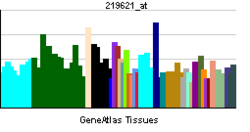CLSPN
| CLSPN | |||||||||||||||||
|---|---|---|---|---|---|---|---|---|---|---|---|---|---|---|---|---|---|
| Identifiers | |||||||||||||||||
| Aliases | CLSPN | ||||||||||||||||
| External IDs | MGI: 2445153 HomoloGene: 11138 GeneCards: CLSPN | ||||||||||||||||
| |||||||||||||||||
| RNA expression pattern | |||||||||||||||||
 | |||||||||||||||||
| More reference expression data | |||||||||||||||||
| Orthologs | |||||||||||||||||
| Species | Human | Mouse | |||||||||||||||
| Entrez | |||||||||||||||||
| Ensembl | |||||||||||||||||
| UniProt | |||||||||||||||||
| RefSeq (mRNA) | |||||||||||||||||
| RefSeq (protein) | |||||||||||||||||
| Location (UCSC) | Chr 1: 35.72 – 35.77 Mb | Chr 4: 126.56 – 126.59 Mb | |||||||||||||||
| PubMed search | [1] | [2] | |||||||||||||||
| Wikidata | |||||||||||||||||
| View/Edit Human | View/Edit Mouse |
Claspin is a protein that in humans is encoded by the CLSPN gene.[3][4][5]
Function
Xenopus claspin is an essential upstream regulator of checkpoint kinase 1 and triggers a checkpoint arrest of the cell cycle in the presence of DNA templates in Xenopus egg extracts. The human gene appears to be the homolog Xenopus claspin and its function has not been determined.[5]
Interactions
CLSPN has been shown to interact with:
References
- ↑ "Human PubMed Reference:".
- ↑ "Mouse PubMed Reference:".
- ↑ Kumagai A, Dunphy WG (Nov 2000). "Claspin, a novel protein required for the activation of Chk1 during a DNA replication checkpoint response in Xenopus egg extracts". Mol Cell. 6 (4): 839–49. doi:10.1016/S1097-2765(05)00092-4. PMID 11090622.
- 1 2 Chini CC, Chen J (Aug 2003). "Human claspin is required for replication checkpoint control". J Biol Chem. 278 (32): 30057–62. doi:10.1074/jbc.M301136200. PMID 12766152.
- 1 2 "Entrez Gene: CLSPN claspin homolog (Xenopus laevis)".
- ↑ Lin SY, Li K, Stewart GS, Elledge SJ (2004). "Human Claspin works with BRCA1 to both positively and negatively regulate cell proliferation". Proc. Natl. Acad. Sci. U.S.A. 101 (17): 6484–9. doi:10.1073/pnas.0401847101. PMC 404071
 . PMID 15096610.
. PMID 15096610. - 1 2 3 Serçin O, Kemp MG (May 2011). "Characterization of functional domains in human Claspin". Cell Cycle. 10 (10): 1599–606. doi:10.4161/cc.10.10.15562. PMC 3127160
 . PMID 21478680.
. PMID 21478680. - ↑ Faustrup H, Bekker-Jensen S, Bartek J, Lukas J, Mailand N (2009). "USP7 counteracts SCFbetaTrCP- but not APCCdh1-mediated proteolysis of Claspin". J. Cell Biol. 184 (1): 13–9. doi:10.1083/jcb.200807137. PMC 2615094
 . PMID 19124652.
. PMID 19124652.
Further reading
- Chini CC, Chen J (2005). "Claspin, a regulator of Chk1 in DNA replication stress pathway.". DNA Repair (Amst.). 3 (8-9): 1033–7. doi:10.1016/j.dnarep.2004.03.001. PMID 15279790.
- Strausberg RL, Feingold EA, Grouse LH, et al. (2003). "Generation and initial analysis of more than 15,000 full-length human and mouse cDNA sequences.". Proc. Natl. Acad. Sci. U.S.A. 99 (26): 16899–903. doi:10.1073/pnas.242603899. PMC 139241
 . PMID 12477932.
. PMID 12477932. - Lin SY, Li K, Stewart GS, Elledge SJ (2004). "Human Claspin works with BRCA1 to both positively and negatively regulate cell proliferation.". Proc. Natl. Acad. Sci. U.S.A. 101 (17): 6484–9. doi:10.1073/pnas.0401847101. PMC 404071
 . PMID 15096610.
. PMID 15096610. - Sørensen CS, Syljuåsen RG, Lukas J, Bartek J (2006). "ATR, Claspin and the Rad9-Rad1-Hus1 complex regulate Chk1 and Cdc25A in the absence of DNA damage.". Cell Cycle. 3 (7): 941–5. doi:10.4161/cc.3.7.972. PMID 15190204.
- Sar F, Lindsey-Boltz LA, Subramanian D, et al. (2004). "Human claspin is a ring-shaped DNA-binding protein with high affinity to branched DNA structures.". J. Biol. Chem. 279 (38): 39289–95. doi:10.1074/jbc.M405793200. PMID 15226314.
- Gerhard DS, Wagner L, Feingold EA, et al. (2004). "The status, quality, and expansion of the NIH full-length cDNA project: the Mammalian Gene Collection (MGC).". Genome Res. 14 (10B): 2121–7. doi:10.1101/gr.2596504. PMC 528928
 . PMID 15489334.
. PMID 15489334. - Clarke CA, Clarke PR (2005). "DNA-dependent phosphorylation of Chk1 and Claspin in a human cell-free system.". Biochem. J. 388 (Pt 2): 705–12. doi:10.1042/BJ20041966. PMC 1138979
 . PMID 15707391.
. PMID 15707391. - Clarke CA, Bennett LN, Clarke PR (2005). "Cleavage of claspin by caspase-7 during apoptosis inhibits the Chk1 pathway.". J. Biol. Chem. 280 (42): 35337–45. doi:10.1074/jbc.M506460200. PMID 16123041.
- Chini CC, Wood J, Chen J (2006). "Chk1 is required to maintain claspin stability.". Oncogene. 25 (30): 4165–71. doi:10.1038/sj.onc.1209447. PMID 16501606.
- Gregory SG, Barlow KF, McLay KE, et al. (2006). "The DNA sequence and biological annotation of human chromosome 1.". Nature. 441 (7091): 315–21. doi:10.1038/nature04727. PMID 16710414.
- Bennett LN, Clarke PR (2006). "Regulation of Claspin degradation by the ubiquitin-proteosome pathway during the cell cycle and in response to ATR-dependent checkpoint activation.". FEBS Lett. 580 (17): 4176–81. doi:10.1016/j.febslet.2006.06.071. PMID 16828751.
- Liu S, Bekker-Jensen S, Mailand N, et al. (2006). "Claspin operates downstream of TopBP1 to direct ATR signaling towards Chk1 activation.". Mol. Cell. Biol. 26 (16): 6056–64. doi:10.1128/MCB.00492-06. PMC 1592810
 . PMID 16880517.
. PMID 16880517. - Mailand N, Bekker-Jensen S, Bartek J, Lukas J (2006). "Destruction of Claspin by SCFbetaTrCP restrains Chk1 activation and facilitates recovery from genotoxic stress.". Mol. Cell. 23 (3): 307–18. doi:10.1016/j.molcel.2006.06.016. PMID 16885021.
- Peschiaroli A, Dorrello NV, Guardavaccaro D, et al. (2006). "SCFbetaTrCP-mediated degradation of Claspin regulates recovery from the DNA replication checkpoint response.". Mol. Cell. 23 (3): 319–29. doi:10.1016/j.molcel.2006.06.013. PMID 16885022.
- Mamely I, van Vugt MA, Smits VA, et al. (2006). "Polo-like kinase-1 controls proteasome-dependent degradation of Claspin during checkpoint recovery.". Curr. Biol. 16 (19): 1950–5. doi:10.1016/j.cub.2006.08.026. PMID 16934469.
- Rodríguez-Bravo V, Guaita-Esteruelas S, Florensa R, et al. (2007). "Chk1- and claspin-dependent but ATR/ATM- and Rad17-independent DNA replication checkpoint response in HeLa cells.". Cancer Res. 66 (17): 8672–9. doi:10.1158/0008-5472.CAN-05-4443. PMID 16951182.
- Chini CC, Chen J (2006). "Repeated phosphopeptide motifs in human Claspin are phosphorylated by Chk1 and mediate Claspin function.". J. Biol. Chem. 281 (44): 33276–82. doi:10.1074/jbc.M604373200. PMID 16963448.
- Sercin O, Kemp MG (2011). "Characterization of functional domains in human Claspin.". Cell Cycle. 10 (10): 1599–606. doi:10.4161/cc.10.10.15562. PMC 3127160
 . PMID 21478680.
. PMID 21478680.